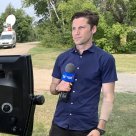On May 27 the Chief Rosanne Casimir of Tk’emlúps te Secwépemc announced the discovery of the remains of 215 Indigenous children at a former residential school.

Ten days later, the statue of Egerton Ryerson toppled the ground next to the plinth at the Toronto university that bears his name — for now.
The discovery in Kamloops reignited the debate about how people in Canada should interact with this country’s history.
Kerry Bellegarde-Opoonechaw said the tributes to people like Sir John A. Macdonald “are a major problem” and that they should be torn down.
“Would you honour anyone that was known for mass murdering people in a nation? I don’t think so,” she said.
Bellegarde-Opoonechaw was instrumental in the campaign to remove the statue of Canada’s first prime minister from Victoria Park in Regina.
She’s a survivor of the ‘60s Scoop and said it’s important the man is also remembered for the devastating impact he had on Indigenous people, and not just for building the transcontinental railway or for helping found the country.
- ‘Alarming trend’ of more international students claiming asylum: minister
- Justin Trudeau headed to UN Summit of the Future amid international instability
- Canadian government’s satellite deal has Tories calling for Elon Musk involvement
- Activists call for Boogie the monkey to be removed from Ontario roadside zoo
The City of Regina removed the statue on April 14 and is in the process of debating where it could be relocated.
Bellegarde-Opoonechaw said she will stay involved with the discussion and told Global News she would like to see the statue moved to a museum, possibly with an attendant nearby who can fully explain how Macdonald’s decisions affected generations of people.
She said the removal must be paired with a more complete reading and teaching of Canadian history that involves exploring the trauma Canada wrecked upon Indigenous people.

Get breaking National news
Ken Coates, a University of Saskatchewan public policy professor, told Global News Canadians must absolutely confront the country’s very dark past — and that Indigenous people must be at the forefront of that process.
But he said placing the blame on a few figureheads excuses the broader, complicit system and precludes examining the forms of oppression that are still very much in place.
“Is the problem that John A. Macdonald was a bad person or that John A. Macdonald had a bad policy or an evil policy?” he asked.
“Sure, that’s part of the problem. But the bigger problem is the fact that almost all non-Indigenous Canadians supported the idea of residential schools.”
He also said focusing on individuals wrongfully restricts the discussion to those individuals, when the residential school system was expanded under several of Macdonald’s successors, like Wilfred Laurier, Louis St. Laurent and John Diefenbaker, as well as scores of other politicians and bureaucrats — not to mention Canadian society writ large.
“All political parties thought they were a good idea,” he said, “the churches thought they were an amazingly good idea and put a huge amount of money and effort into them.”
“But what you’re really talking about is a fundamental failure of Canada.”
“That’s where we went wrong in that context. Residential schools are a symptom of the problem.”
He also said it shouldn’t have taken ground-penetrating radar for non-Indigenous people to take the claims of missing children seriously, pointing out that residential school survivors had spoken about it for centuries.
Instead of tearing down statues of men like Macdonald or Ryerson — at least for now — Coates said people should erect memorials to those who suffered and died in residential schools next to the colonial leaders, as well as monuments to Indigenous leaders.
Bellegarde-Opoonechaw said she would like to see more statues toppled and have flowers replace them.
She said Canada needs a new history — one that lets her nine-year-old daughter have the future she didn’t.
“This lit the fire for the next generation because now they understand why our ancestors struggled and are not here.”
Anyone experiencing pain or distress as a result of their residential school experience can access this 24-hour, toll-free and confidential National Indian Residential School Crisis Line at 1-866-925-4419
— With files from CFJC Today’s James Peters, David Lao and Amy Judd








Comments